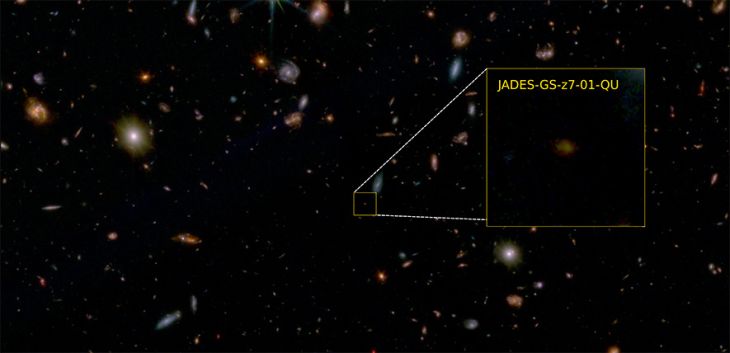Using the James Webb Space Telescope, an international team of astronomers led by the University of Cambridge have spotted a ‘dead’ galaxy when the universe was just 700 million years old, the oldest such galaxy ever observed.
This galaxy appears to have lived fast and died young: star formation happened quickly and stopped almost as quickly, which is unexpected for so early in the universe’s evolution. However, it is unclear whether this galaxy’s ‘quenched’ state is temporary or permanent, and what caused it to stop forming new stars.
The results, reported in the journal Nature, could be important to help astronomers understand how and why galaxies stop forming new stars, and whether the factors affecting star formation have changed over billions of years.
“The first few hundred million years of the universe was a very active phase, with lots of gas clouds collapsing to form new stars,” said Tobias Looser from the Kavli Institute for Cosmology, the paper’s first author. “Galaxies need a rich supply of gas to form new stars, and the early universe was like an all-you-can-eat buffet.”
“It’s only later in the universe that we start to see galaxies stop forming stars, whether that’s due to a black hole or something else,” said co-author Dr Francesco D’Eugenio, also from the Kavli Institute for Cosmology.
Astronomers believe that star formation can be slowed or stopped by different factors, all of which will starve a galaxy of the gas it needs to form new stars. Internal factors, such as a supermassive black hole or feedback from star formation, can push gas out of the galaxy, causing star formation to stop rapidly. Alternatively, gas can be consumed very quickly by star formation, without being promptly replenished by fresh gas from the surroundings of the galaxy, resulting in galaxy starvation.
“We’re not sure if any of those scenarios can explain what we’ve now seen with Webb,” said co-author Professor Roberto Maiolino. “Until now, to understand the early universe, we’ve used models based on the modern universe. But now that we can see so much further back in time, and observe that the star formation was quenched so rapidly in this galaxy, models based on the modern universe may need to be revisited.”
Using data from JADES (JWST Advanced Deep Extragalactic Survey), the astronomers determined that this galaxy experienced a short and intense period of star formation over a period between 30 and 90 million years. But between 10 and 20 million years before the point in time where it was observed with Webb, star formation suddenly stopped.
“Everything seems to happen faster and more dramatically in the early universe, and that might include galaxies moving from a star-forming phase to dormant or quenched,” said Looser.
Astronomers have previously observed dead galaxies in the early universe, but this galaxy is the oldest yet – just 700 million years after the big bang, more than 13 billion years ago. This observation is one of the deepest yet made with Webb.
In addition to the oldest, this galaxy is also relatively low mass – about the same as the Small Magellanic Cloud (SMC), a dwarf galaxy near the Milky Way, although the SMC is still forming new stars. Other quenched galaxies in the early universe have been far more massive, but Webb’s improved sensitivity allows smaller and fainter galaxies to be observed and analysed.
The astronomers say that although it appears dead at the time of observation, it’s possible that in the roughly 13 billion years since, this galaxy may have come back to life and started forming new stars again.
“We’re looking for other galaxies like this one in the early universe, which will help us place some constraints on how and why galaxies stop forming new stars,” said D’Eugenio. “It could be the case that galaxies in the early universe ‘die’ and then burst back to life – we’ll need more observations to help us figure that out.”
The research was supported in part by the European Research Council, the Royal Society, and the Science and Technology Facilities Council (STFC), part of UK Research and Innovation (UKRI).
Reference:
Tobias J. Looser et al. ‘A recently quenched galaxy 700 million years after the Big Bang.’ Nature (2024). DOI: 10.1038/s41586-024-07227-0







